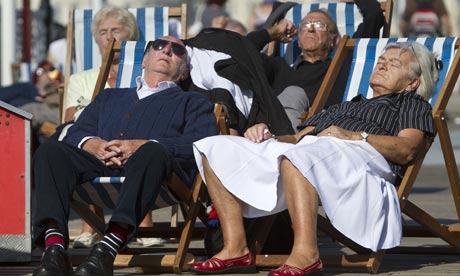
A delicious feeling of smugness enveloped the idle at heart when we read that Britain's oldest man, 110-year-old Reg Dean from Derbyshire, attributed his longevity to "being lazy". Now I'm no biologist, but it seems to make a lot of sense that slow lives, as well as being enjoyable, are long lives. One only has to think of the example of the tortoise for proof of this theory from the animal world.
That laziness might be good for your health is not a particularly fashionable view in an age when slothful Britons are castigated by politicians who praise the "hard-working family", and schools and cereal packets alike push "healthy lifestyles". Meanwhile we have had to suffer the spectacle of the Olympian ideal this summer, with vast parades of hyper-fit athletes bringing guilt to we slugabeds. The active life is the dominant model to which we are supposed to conform.
But the active life is full of stress. It puts enormous pressures on our bodies. Long hours in the office lead to anxiety, depression and even nervous breakdown. And an excess of physical activity can be dangerous: four men died while taking part in the Great North Run, a half marathon, in September.
Laziness works. And the simple way to incorporate its health benefits into your life is simply to take a nap. A study of 23,681 Greek adults in 2007 found that those who took a siesta lived longer. Systematic nappers had a 37% lower chance of suffering from coronary mortality. I imagine though that this life-affirming Greek custom is under attack from the supposedly "hard-working" Germans, who, one gets the impression, have been encouraging the Greeks to toil harder in return for loans following the recent financial collapse.
The reason laziness is rarely pushed as a lifestyle option is down to one simple reason: money. There are fortunes to be made out of active lifestyles. Gyms charge fees. But no one is going to make money out of sleep. It is free. Who would pay for a billboard campaign that declares "Tired? Take A nap"?
There are some encouraging signs out there in the corporate world, believe it or not, as far as naps go. Arianna Huffington of the Huffington Post is an advocate of napping, and is reported to have commented "it's better to have a nap than a doughnut". I would add that it's better to have a nap than a cup of coffee. These corporate naps are encouraged because they are seen to boost productivity, so we should perhaps be wary of endorsing them, but more sleep is a good thing even if it is serving the growth of the capitalist economy.
Pottering in the garden and intellectual inquiry are time-honoured forms of respectable laziness. After all, it was Aristotle who believed that the vita contemplativa, the life filled with enough time for pondering the essentials, was more likely to lead to fulfilment than the life of the busy merchant or the honour-seeking politician. And wise Epicurus counselled a retreat from city life and the cultivation of gardens as a route to finding what he called "undisturbedness".
Both these ancient Greek ideals come together in a recent pamphlet from a thinktank, the New Economics Foundation, called National Gardening Leave, which has the appealing sub-title "why Britain would be better off if we all spent less time in the office". The authors put forward the case for a four-day week, which would allow both a more equitable distribution of available employment and more time for pootling around doing nothing in particular.
Not convinced? Sleep on it.

